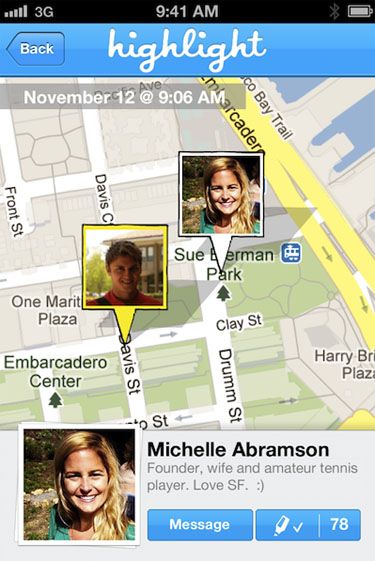
Paul Davison wanted to take on a big problem in the world, so he did.
“The people we bring into our lives are the most important things in our world,” he says. “But the way we meet and connect with people is completely random and inefficient. Especially when people move to new areas, it’s really hard to meet new people. It’s a bad system -- if you could take a bird’s eye view from above and put the right people together, life would be better for everyone.”
Davison has a solution. He is co-founder and CEO of Highlight, a mobile ambient awareness app.
You might think of it this way. We are all walking around with these incredibly smart computers in our pockets, filled with data, location-awareness, search and discovery functionality.
When two phones are near each other, they know it. They know who their owners are, and can be enabled to know whether they have friends in common or share interests – all sorts of useful data.
But the owners of the phones don’t know any of this about each other, and most of the time they’re not going to strike up conversation with a random stranger to find out.
That’s where Highlight comes in.
You sign in to the app with your Facebook ID (or on an android you can also use your LinkedIn profile), choose what to display in your profile, and Highlight will alert you via push notification when someone you share things in common with is nearby.
“We all love to share things about ourselves,” notes Davison. “And we do it all the time, wearing T-shirts or caps naming the products or sports teams we follow, but starting up conversations in the real world can be risky and intimidating.
"So much of the time we do nothing but stand around awkwardly starting at our phones. It’s bizarre but we live in a city of 800,000 strangers.”
Highlight gives a highly selective subset of those strangers’ names and faces – perhaps two out of 200 people nearby, for example. These are folks you share friends, interests, or previous encounters with. It’s also a great help with the simple but difficult task of remembering someone’s name.
“Anytime two phones are near each other and have Highlight, a decision has to be made,” says Davison. “But it’s smart and doesn’t notify you about your roommate or a coworker at the office. It gets smarter over time and learns from your use. It knows if you are driving you probably don’t want to get a notification, but if you’re riding on Caltrain, maybe you do.”
This kind of new social discovery tool, much like Google Glass, is far too early in development for any useful social norms to have developed yet, but Davison says early adopters of Highlight, which launched in late 2011 and made a splash at SXSW last year, say the shared sense of space makes contacting one another a non-awkward experience.
“All of a sudden for the first time in human history these technologies are changing the world of human interaction,” is how he puts it. “It’s never been possible before, so it may feel strange and uncomfortable at first. But what we are finding is that people are very well-behaved, and friendly.”
The radius of the area Highlight checks varies by how densely populated the place is. So, in downtown San Francisco, where the company is headquartered, it might be checking a distance of 150 meters, whereas in Yosemite, it might pull in contacts who are well beyond that but still in the general vicinity.
Highlight’s fans seem to be using the app for many different purposes, including professional networking, dating, socializing, knowing when guests arrive at an event, remembering people’s names, promoting products or services, wishing each other happy birthday, hiring/recruiting, photo sharing, and so on.
The company knows that trust and privacy are major concerns (which we first covered when it was all the rage at SXSW in 2012) and it has built in plenty of controls. You can limit your connections to close friends and family only, you can block people, you can also designate “hiding spots,” where the app will not record or reveal your location to anyone.
Davison stresses that the service is entirely opt-in, and the only data that is collected or displayed is that you the user has decided to share. Highlight does not collect data from other sources, “so we give people granular control over their privacy.”
The team of 7 has localized Highlight to 11 languages, including Japanese, Chinese and Korean, and they are seeing rapid adoption overseas. The app is available both for iOS and android.
When I think about where the world is headed thanks to apps like Highlight, I can’t help but wonder what Mae West would say.
"Hey there, is that a smartphone in your pocket, or are you just glad to see me?"
Related Articles

